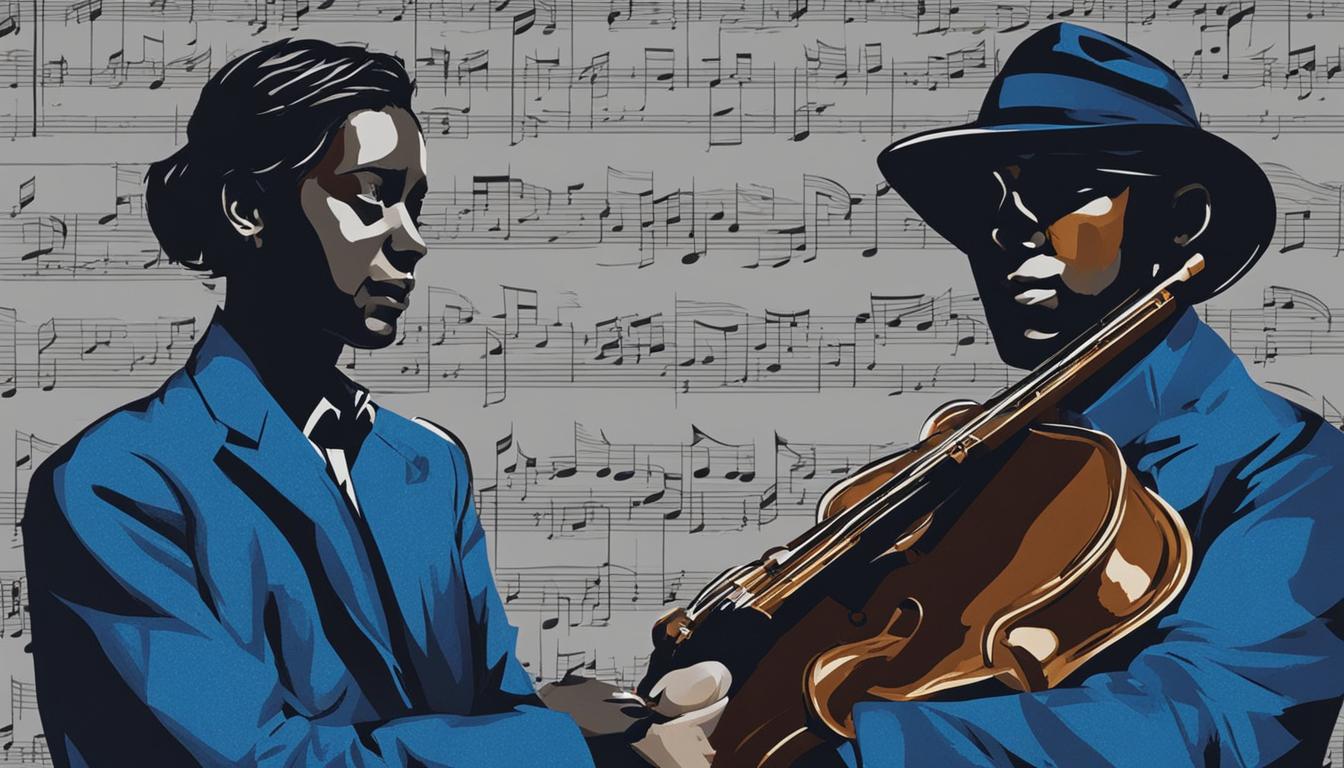In this audiobook review, we delve into the depths of Richard Powers’ novel “The Time of Our Singing.” A beautifully crafted story that explores music, race, and time in a poignant and profound way. Powers’ writing style transports readers to a different era, immersing them in the vibrant culture of mid-twentieth-century America.
“The Time of Our Singing” is a book that leaves a lasting impression, forcing readers to confront the complexities of identity, culture, and belonging. In this article, we’ll explore the key themes and ideas present in the audiobook version of this literary masterpiece.”
Key Takeaways
- Richard Powers’ “The Time of Our Singing” is a novel that explores the themes of music, race, and time in a profound and thought-provoking way.
- The audiobook version of “The Time of Our Singing” offers a captivating listening experience, bringing to life the compelling narrative and complex characters.
- Powers’ writing transports readers to a different era, immersing them in the vibrant culture and society of mid-twentieth-century America.
- The novel offers an intimate look at the challenges of identity, belonging, and cultural heritage in a racially divided America.
- “The Time of Our Singing” is a timeless book that continues to resonate with readers and shape conversations today.
Overview of “The Time of Our Singing”
Richard Powers’ “The Time of Our Singing” is a powerful and thought-provoking novel that explores themes such as music, race, and time. The story follows the Strom family, consisting of the African-American Delia Daley and the German-Jewish David Strom, and their three children. Set in the backdrop of America during the twentieth century, this novel showcases the challenges of being biracial during a time of racial division and tension.
The novel also delves into the transformative power of music and the way it can bring people together across cultural boundaries. The characters’ experiences with music shape the narrative and provide insight into the human experience.
With “The Time of Our Singing,” Powers creates a work of literature that is both profound and emotionally resonant. As an audiobook, the story comes to life in a unique way, allowing listeners to fully immerse themselves in the world of the Strom family.
In the following sections, we will dive deeper into the themes and symbolism present in the novel, as well as the critical reception and legacy of this important work.
The Power of Music in “The Time of Our Singing”
The Time of Our Singing is a novel that highlights the transformative power of music. Through the characters in the book, Powers illustrates how music can be a tool for breaking down barriers between people of different cultures, expressing emotions, and preserving cultural heritage.
Whether it’s Jonah’s deep love of classical music, or Joseph’s affinity for gospel and jazz, music becomes a vehicle for the characters to connect with each other and the world around them. Powers uses music to draw readers into the heart of the story, creating an unforgettable reading experience.
One of the most memorable scenes in the book occurs when the Delany children perform a concert in Washington D.C. during the Civil Rights Movement. As they play, tensions between the audience melt away, creating a moment of unity and hope. This scene underscores the message that music can transcend the barriers of time, race, and culture in a way that few other things can.
“Music confronts you with your own past and emotions in a way that nothing else can. It’s like a time machine, taking you back to moments that you thought were lost forever.”
By exploring the role of music in “The Time of Our Singing,” Powers challenges readers to consider the power of art to create change in the world. Through the lens of music, he encourages us to imagine a world where cultural and racial differences are celebrated, rather than feared, and where everyone has the opportunity to express themselves fully.
Race and Identity in “The Time of Our Singing”
Richard Powers’ novel “The Time of Our Singing” is a sensitive exploration of race and identity in America. Through the experiences of biracial characters, Powers offers profound insights into the human experience of navigating a racially divided society. The novel presents a nuanced examination of how race intersects with identity and self-perception, challenging readers to consider the complexities of these issues.
Throughout the story, the characters confront the limitations and prejudices imposed by society’s racial structures, shaping their understanding of self and belonging. The novel portrays the impact of racial discrimination on individual lives and the collective psyche. The narrative’s power lies in the way it approaches identity, moving beyond a simplistic discussion of race to explore how we each reconcile our various identities and experiences.
“The problem with race is that every- one thinks they’re experts because they belong to whatever race they do. It’s like people saying the proof of the pudding is in the eating. Who makes the pudding, man? Who watches over? Who butchers, who grinds the flour, who fires the sugar? If we could only fully comprehend that it’s all man-made, we could maybe get on with the business of enjoying each other’s differences.”
Characters’ Ethnicity
| Character | Ethnicity |
|---|---|
| David Strom | Ashkenazi Jewish |
| Delia Daley | African American |
| Joey Strom | Bi-racial |
| Jonah Strom | Bi-racial |
The table above highlights the ethnicities of the main characters in “The Time of Our Singing.” The characters’ different backgrounds provide a lens through which to explore issues of race and identity, deepening our understanding of how these factors shape individual experiences. Overall, “The Time of Our Singing” invites readers to reflect on how our unique identities influence our interactions with the world and with each other.
The Concept of Time in “The Time of Our Singing”
Richard Powers masterfully explores the concept of time in “The Time of Our Singing,” transcending traditional linear perceptions. The narrative is grounded in historically significant moments, such as the Civil Rights Movement, punctuated with time lapses and shifting perspectives. Powers’s manipulation of time creates a captivating and multi-layered story that challenges readers to question their understanding of time.
One way Powers blurs the boundaries of time is through his characters’ experiences with temporal dissonance. These moments of subjective time, where time seems to feel different for each character, are witnessed through the book’s three main characters, each with their own distinct temporal landscape. Delia, David, and Jonah’s experiences with time allow readers to see how time is a subjective experience and often a product of our psychological state.
Beyond subjective time, “The Time of Our Singing” presents readers with paradoxes surrounding time’s linearity. Central to the story is the paradox of time travel, where the act of revisiting the past would only serve to further establish the present that travelers seek to escape. Such moments underscore the idea that time is not as linear as it seems, rather past, present, and future often exist simultaneously.
“Time is a human concept,” writes Powers, “no more solid than race, or civilization, or art.”
The concept of time in “The Time of Our Singing” is a reminder that the way we see and experience time is by no means definite or objective. Powers challenges readers to question the aspects of time that we take for granted and provides a rich and thought-provoking exploration of the subject.
Narration and Performance in the Audiobook Version
When it comes to audiobooks, the narration and performance of the reader can make or break the overall listening experience. In the case of “The Time of Our Singing,” the audiobook version is narrated by Jeremy Gage, who brings a level of emotional depth and authenticity to the story that is unparalleled.
Gage’s rich and nuanced performance captures the essence of each character, from the conflicted and complicated David Strom to the fiercely independent and musically gifted Josephine Baker. His ability to convey the subtleties of their personalities and emotions draws the listener in, making them feel like they are right there in the room with the characters.
But it’s not just the characterization that makes Gage’s narration stand out. He also nails the pacing, rhythm, and tone of the book, capturing the musicality of Powers’ prose and imbuing each sentence with a palpable sense of emotion and intensity.
The result is an audiobook experience that is truly immersive and captivating, bringing “The Time of Our Singing” to life in a way that is both powerful and memorable.
“Gage’s rich and nuanced performance captures the essence of each character, from the conflicted and complicated David Strom to the fiercely independent and musically gifted Josephine Baker.”
Critical Reception and Awards
Richard Powers’ “The Time of Our Singing” has been praised by both critics and literary enthusiasts alike.
The novel was a finalist for the Pulitzer Prize for Fiction in 2004 and won the Ambassador Book Award for Fiction in 2004. It was also selected as a New York Times Notable Book and an American Library Association Notable Book in 2003.

“[The Time of Our Singing is] a novel of extraordinary achievement, showcasing Richard Powers’ prodigious gift for storytelling, his deep understanding of music, and his grasp of the complex interplay of history, race, and time in the American experience.”
As an intricate exploration of music, race, and time, “The Time of Our Singing” has left a lasting impression on readers, cementing its place as a modern literary classic.
Themes and Symbolism in “The Time of Our Singing”
Richard Powers’ “The Time of Our Singing” explores a myriad of themes through powerful storytelling, interweaving symbolism and motifs to create a rich tapestry of meaning and interpretation.
One of the central themes is the relationship between music and identity, reflecting the role music plays in shaping cultural narratives and personal expression. The metaphor of music as a unifying force is critiqued as elements of race and power dynamics complicate the role music plays in this novel.
Race is another theme found to be significant in “The Time of Our Singing”. Delving into the nuances of family and community dynamics of biracial individuals in a segregated society, Powers’ work offers a closer look at the complex dialogue that has always ensued in America.
Another recurring motif is time and how it operates in the novel. The manipulation of timelines, being stretched and compressed, and the power of music to transcend these barriers, Power’s story serves as a metaphor for the limits placed on individuals within social and cultural constructs.
The symbolism in the text is used for many purposes, and in Richard Powers’ case, music acts as one of the primary examples. Music functions as a metaphor throughout the book – the freedom, the passion, and inspiration that the characters feel in response to music all represent a broader sense of yearning and connection that permeates the entire novel.
Finally, the novel’s use of birds as a significant motif is notable. The feathered creatures add to the symbolic imagery of freedom, as birds have long been viewed as symbols of independence and liberation.
Symbolism and Motifs in “The Time of Our Singing”
| Symbolism/Motif | Meaning |
|---|---|
| Music | Expression, connection, and cultural identity |
| Race | Challenges faced by biracial individuals in a segregated society |
| Time | The manipulation of timelines and the power of music to transcend them |
| Birds | Symbol of freedom, independence, and liberation |
| Family | Complex dynamics of family relationships |
Further reading of “The Time of Our Singing” reveals that the power of its writing goes beyond the surface level. The critical interpretation of Symbols and Motifs is where Powers challenges readers to dig deeper and to take away a richer reading experience.
The Legacy of “The Time of Our Singing”
Richard Powers’ novel “The Time of Our Singing” is a literary masterpiece that has left a lasting impact on readers and society. The book’s themes of music, race, and time continue to resonate and shape conversations today, cementing its place as a significant work of literature.
“‘The Time of Our Singing’ is a staggering achievement…it is a virtuosic performance that stands as an enduring testament to the powers of the novel.”
Renowned for its exquisite prose and profound exploration of the human experience, “The Time of Our Singing” has garnered critical acclaim and several awards, including the Ambassador Book Award and the James Fenimore Cooper Prize for historical fiction. Its legacy is evident in the way it has inspired subsequent generations of authors to tackle similarly complex and important themes in their own works.
With its unforgettable characters, rich symbolism, and insightful social commentary, “The Time of Our Singing” has secured its place as a pioneering work that continues to resonate with readers today. As Richard Powers’ intricate exploration of music, race, and time remains as relevant and thought-provoking as ever, it is sure to stand the test of time and continue to inspire readers for years to come.

Conclusion
In conclusion, Richard Powers’ “The Time of Our Singing” audiobook delivers a captivating and impactful experience. Our comprehensive analysis of the novel has revealed the profound exploration of music, race, and time that Powers has woven into the story.
Whether you are a long-time fan of the author’s work or simply curious to learn more, “The Time of Our Singing” offers an emotionally resonant journey that is sure to leave a lasting impression. The audiobook version, with its expert narration and performance, only serves to enhance the overall experience.
As we reflect on the legacy of “The Time of Our Singing,” we recognize its enduring impact on literature and society. Its themes and ideas continue to resonate and inspire conversations today, making it a timeless masterpiece.



